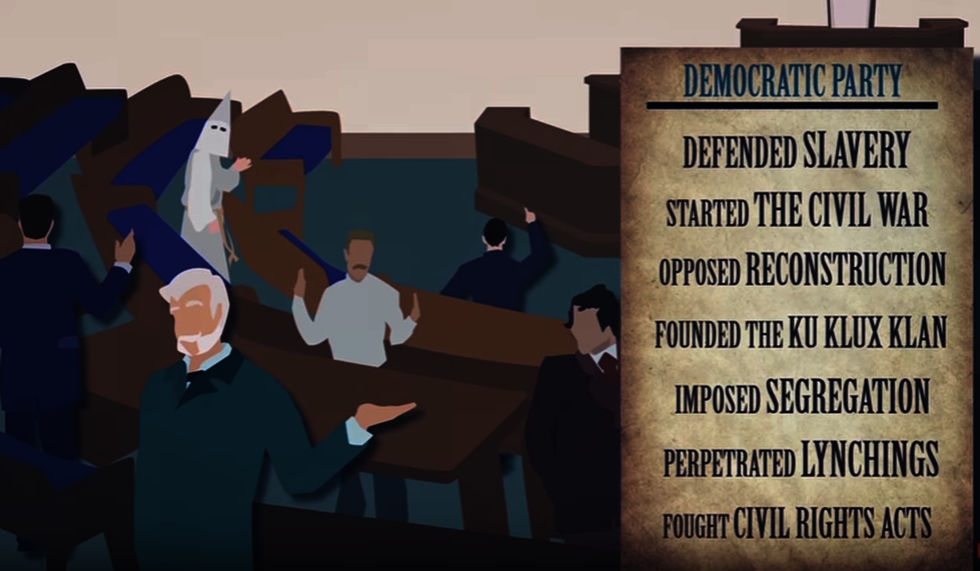
PragerU's latest video recounts the true history of the Democratic Party's racism. (Image Source: PragerU YouTube screenshot)

Radio show host Dennis Prager's conservative/libertarian educational video group Prager U teamed up with author and controversial Vanderbilt University professor Carol Swain to dispel the notion that the Republican Party is the racist entity in Washington, D.C.'s, two-party system.
Swain has caused uproar in the past by stating in a 2015 article for The Tennessean that we must "institute serious monitoring of Islamic organizations." She is also a heavy critic of the racial activist group, Black Lives Matter, calling it a "very destructive force" during an interview on CNN last July.
In the video titled, "The Inconvenient Truth About the Democratic Party," Swain explained that despite modern notions that the Republican Party is causing grief for minorities, its record of fighting for the freedom and civil rights of minorities is stellar, and that it was the Democratic Party that consistently attempted to stand in the way of civil rights.
"Since its founding in 1829, the Democratic Party has fought against every major civil rights initiative, and has a long history of discrimination," Swain said.
"The Democratic Party defended slavery, started the Civil War, opposed Reconstruction, founded the Ku Klux Klan, imposed segregation, perpetrated lynchings, and fought against the civil rights acts of the 1950s and 1960s," she said.
Swain recounted the founding of the Republican Party in 1854 as the anti-slavery party, with the intention of abolishing the practice of slavery, and stopping its expansion into the western territories. Their first attempt to abolish slavery failed when the Supreme Court ruled that slaves were not citizens, but were property in the 1857 case of Dred Scott v. Sandford. Of the nine justices on the Supreme Court at that time, the seven who voted for slavery were all Democrats, but the two dissenting justices were both Republican.
Swain then explained how the issue of slavery was resolved during the Civil War, prompting the creation of the 13th Amendment (abolishing slavery), the 14th Amendment (granting blacks citizenship), and the 15th Amendment (granting blacks the right to vote). All of these amendments, Swain said, were resisted by every Democrat in office, and only passed because of universal Republican support.
Swain continued by telling of the Democrats segregation efforts that began during the reconstruction era, and continued all the way through to the 1960s, when Democrats took measures that suppressed the rights of blacks to vote, or own property. This was stopped by the Civil Rights Act, which Democrats filibustered for 75 days. Republicans eventually claimed victory in favor for the Civil Rights Act, Swain said, but the Democrats would go on to adopt a new tactic.
"And when all of their efforts to enslave blacks, keep them enslaved, and then keep them from voting had failed, the Democrats came up with a new strategy: If black people are going to vote, they might as well vote for Democrats. As President Lyndon Johnson was purported to have said about the Civil Rights Act, 'I’ll have them n*****s voting Democrat for two hundred years,'" Swain said.
Johnson's "war on poverty," enacted anti-poverty legislation such as the Food Stamp Act of 1964, and the Social Security Act of 1964. From 1965 to 1974, government provided benefits increased by a factor of 2o. As the Cato Institute noted in a study, these entitlement programs incentivized lifestyles that encouraged government dependence such as single motherhood in order to continue to receive greater government benefits. This reliance on government dependence encourages voting in favor of the party that champions welfare and entitlements.
"So now, the Democratic Party prospers on the votes of the very people it has spent much of its history oppressing."